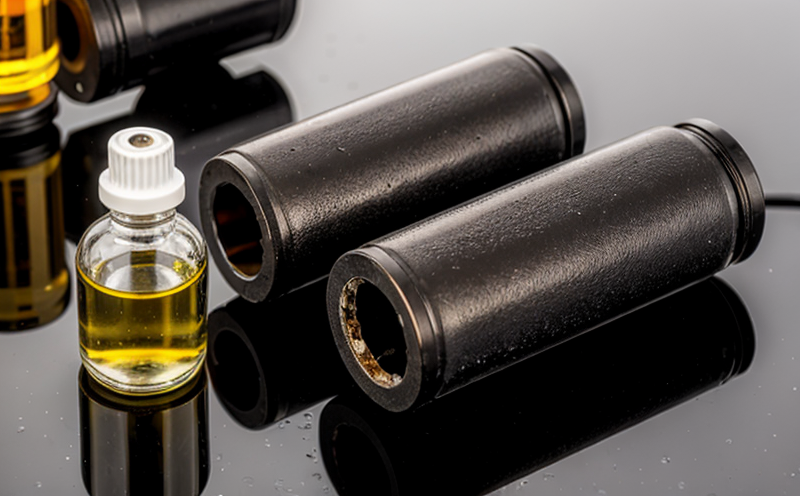ASTM D7679 Synthetic Oil Hydrocarbons Test in Water
The ASTM D7679 synthetic oil hydrocarbon test is a critical procedure used to assess the contamination level of synthetic oils within water samples. This method ensures that water bodies are not adversely affected by the presence of synthetic lubricants, which can have significant environmental and health impacts if not managed properly.
Synthetic oils are widely used in various industries due to their superior performance characteristics compared to mineral-based oils. However, when these oils enter water systems, they pose a risk to aquatic ecosystems as well as human health through the food chain. The ASTM D7679 test is designed to quantify the amount of synthetic oil present in water samples, providing essential data for environmental monitoring and compliance.
The testing process involves several key steps: sample collection, preparation, extraction, and analysis using gas chromatography with mass spectrometry (GC-MS). The target hydrocarbons include specific compounds such as alkylated aromatics, alkenes, and cycloalkanes commonly found in synthetic oils. These compounds are identified based on their retention times and mass spectra, ensuring accurate quantification.
Proper sample preparation is crucial for obtaining reliable results. This includes filtration to remove particulate matter, followed by solvent extraction using either hexane or dichloromethane. The extracted phase is then analyzed using GC-MS equipped with a polar column suitable for separating hydrocarbons based on their boiling points and polarity.
The ASTM D7679 standard specifies strict tolerances for reporting results. Any detected synthetic oil hydrocarbon must be reported along with its concentration in milligrams per liter (mg/L). Compliance limits may vary depending on local regulations, but generally aim to minimize environmental impact by keeping concentrations below certain thresholds established by national or international bodies.
Accurate and consistent application of this test is essential for ensuring reliable data. Laboratories specializing in water quality testing should adhere strictly to the ASTM D7679 procedure to avoid discrepancies between laboratories. Regular calibration of instruments, proper training of analysts, and adherence to standard operating procedures are all necessary components of effective implementation.
By leveraging advanced analytical techniques like GC-MS, modern laboratories can provide precise measurements that help protect both natural water resources and public health. This test serves as an important tool for environmental managers, compliance officers, R&D engineers, and procurement professionals who need to ensure that synthetic oil hydrocarbons do not exceed acceptable levels in water bodies.
Applied Standards
The ASTM D7679 standard is widely recognized as the authoritative method for determining synthetic oil hydrocarbon content in water. This test has been adopted by regulatory agencies worldwide to ensure consistent and reliable measurement of these compounds. Compliance with this standard ensures that laboratories meet rigorous quality assurance requirements.
- ASTM D7679-18: Standard Test Method for Determination of Synthetic Oil Hydrocarbons in Water
- ISO 12305: Environmental Protection - Guidelines for Sampling and Analysis of Synthetic Oils in Water
- EN ISO 14936: Waste Water Quality - Determination of Synthetic Lubricants in Sewage Sludge Using Gas Chromatography with Mass Spectrometry (GC-MS)
The use of these standards ensures that all parties involved understand the expectations for sample preparation, analysis methods, and reporting procedures. Compliance helps maintain trustworthiness across industries and regions.
Quality and Reliability Assurance
To ensure high-quality results in ASTM D7679 synthetic oil hydrocarbon testing, several quality control measures are implemented:
- Calibration: Regular calibration of GC-MS instruments using certified reference materials.
- Reproducibility: Verification that results from multiple analysts or laboratories yield consistent findings within specified tolerances.
- Reference Samples: Utilization of known synthetic oil hydrocarbon samples to validate test methods and calibrate instrumentation.
- Data Integrity: Implementation of robust data management systems to track all aspects of the testing process from sample receipt to final report generation.
The combination of these practices guarantees that every ASTM D7679 synthetic oil hydrocarbon analysis conducted meets industry standards and provides accurate, reliable information.
Use Cases and Application Examples
The ASTM D7679 test finds application in various sectors including environmental protection, industrial hygiene, and occupational safety. Here are some practical examples:
- Industrial Hygiene: Monitoring synthetic oil releases during manufacturing processes to prevent worker exposure.
- Occupational Safety: Assessing the potential health risks associated with synthetic oil contamination in workplace environments.
- Environmental Protection: Evaluating the impact of accidental or deliberate discharges into water systems due to improper disposal practices.
In each case, accurate determination of synthetic oil hydrocarbon levels is vital for taking appropriate corrective actions. The results from ASTM D7679 tests serve as crucial inputs for decision-making processes aimed at minimizing adverse effects on both human health and the environment.





